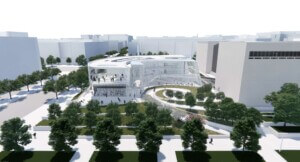Could the average corporate employee soon rocket off for a day at work in low Earth orbit (LEO) in true Jetsons fashion? Likely not, but the Jeff Bezos-owned Blue Origin is looking to make that dream a reality. On October 25, Blue Origin announced plans for the Orbital Reef, a mixed-use space station that the rocket company and partner and manufacturer Sierra Space are hoping to put in LEO sometime in the second half of this decade.
Described by Blue Origin as a “mixed-use business park in space,” Orbital Reef is being pitched towards countries without their own dedicated space programs, deep-pocketed entrepreneurs, companies who need to do technological and microgravity research in space, and both the media and hospitality industries.
Blue Origin is planning on supplying end-to-end transportation to and from the station, leasing, amenities, and hands-on technical help, but it will be up to customers to supply their own capsules to attach to Orbital Reef. The thinking is that clients will be able to customize their spaces to their needs, but for less technically experienced or capable customers, Blue Origin will offer “any level of help” through its Reef Starter incubator. The basic capsule, according to Blue Origin, will offer a mixture of scientific space and living quarters across approximately 29,300 cubic feet (a hair under the 32,333 cubic feet of occupiable space contained within the International Space Station).
“For over sixty years, NASA and other space agencies have developed orbital space flight and space habitation, setting us up for commercial business to take off in this decade,” said Brent Sherwood, Senior Vice President of Advanced Development Programs for Blue Origin, in a press release. “We will expand access, lower the cost, and provide all the services and amenities needed to normalize space flight. A vibrant business ecosystem will grow in low Earth orbit, generating new discoveries, new products, new entertainments, and global awareness.”
Of course, this all presumes Blue Origin will be able to rapidly advance its reusable rocket technology over the next 8 years at maximum. (Sierra Space will be responsible for the Orbital Reef’s Large Integrated Flexible Environment (LIFE) module, node module, and universal runways that can be deployed worldwide for spaceplane takeoffs and landings.) Although Blue Origin is backed by theoretically unlimited amounts of cash and has hired top technical talent from across the aerospace industry, SpaceX has been, charitably, eating the company’s lunch as Elon Musk’s company has officially partnered with NASA to deliver crew and cargo to and from the ISS.
A series of scathing exposes last month reveal that the large gap between the two is largely the result of mismanagement; as The Guardian noted, miscommunications between upper management and engineers and a culture of hostility towards women have reportedly led to mass departures in recent years.
Whether Blue Origin can pull off Orbital Reef or not, it will have a lot of competition. Last year NASA tapped Philippe Stark to design a hotel capsule for the ISS, Virgin Galactic is rapidly ramping up its ambitions, and the next generation of space stations could be built from new and novel materials left unexplored in Blue Origin’s proposal.











